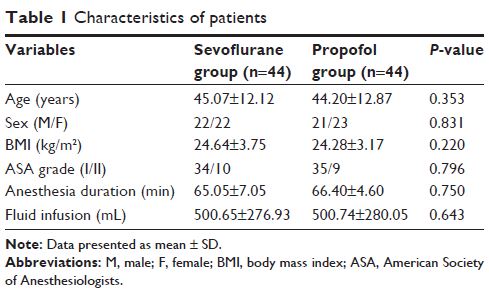108985
论文已发表
注册即可获取德孚的最新动态
IF 收录期刊
- 3.4 Breast Cancer (Dove Med Press)
- 3.2 Clin Epidemiol
- 2.6 Cancer Manag Res
- 2.9 Infect Drug Resist
- 3.7 Clin Interv Aging
- 5.1 Drug Des Dev Ther
- 3.1 Int J Chronic Obstr
- 6.6 Int J Nanomed
- 2.6 Int J Women's Health
- 2.9 Neuropsych Dis Treat
- 2.8 OncoTargets Ther
- 2.0 Patient Prefer Adher
- 2.2 Ther Clin Risk Manag
- 2.5 J Pain Res
- 3.0 Diabet Metab Synd Ob
- 3.2 Psychol Res Behav Ma
- 3.4 Nat Sci Sleep
- 1.8 Pharmgenomics Pers Med
- 2.0 Risk Manag Healthc Policy
- 4.1 J Inflamm Res
- 2.0 Int J Gen Med
- 3.4 J Hepatocell Carcinoma
- 3.0 J Asthma Allergy
- 2.2 Clin Cosmet Investig Dermatol
- 2.4 J Multidiscip Healthc

七氟醚 (Sevoflurane) 与异丙酚 (propofol) 对腹腔镜手术中脑血管对二氧化碳反应性的影响对比
Authors Wang C, Ni C, Li G, Li Y, Tao L, Li N, Wang J, Guo X
Received 13 July 2017
Accepted for publication 31 August 2017
Published 10 October 2017 Volume 2017:13 Pages 1349—1355
DOI https://doi.org/10.2147/TCRM.S146272
Checked for plagiarism Yes
Review by Single-blind
Peer reviewers approved by Dr Colin Mak
Peer reviewer comments 2
Editor who approved publication: Professor Deyun Wang
Purpose: Cerebrovascular reactivity to carbon dioxide (CVR-CO2) reflects cerebrovascular reserve capacity, which is important in many
brain disorders, including cerebrovascular and Alzheimer’s diseases. Meanwhile,
there is a relationship between CVR-CO2 and cognitive function. Therefore, the study is aimed at
investigating the effects of sevoflurane versus propofol on CVR-CO2 during laparoscopic surgery, as well as the role of CVR-CO2 on cognitive function during perioperative period.
Patients and
methods: Eighty-eight patients, aged 18–65
years undergoing elective laparoscopic cholecystectomy, were randomly assigned
to group S and group P. The patients in group S were induced with propofol
and maintained with sevoflurane. The patients in group P were induced and
maintained with propofol (target-controlled infusion). Remifentanil was given
to both groups. CVR-CO2 at baseline (before induction), before pneumoperitoneum and during
pneumoperitoneum, as well as Mini-Mental State Examination scores at baseline
and 24 hours after surgery were recorded.
Results: In group S, CVR-CO2 before and during pneumoperitoneum increased significantly
compared with baseline (P <0.05). In
group P, CVR-CO2 before
pneumoperitoneum increased significantly (P <0.05), but
CVR-CO2 during
pneumoperitoneum was not different compared with baseline. In either group,
there was no significant correlation between mean blood pressure and CVR-CO2 during surgery, and there was no significant difference between
Mini-Mental State Examination scores at baseline and 24 hours after surgery.
Conclusion: Sevoflurane could maintain CVR-CO2 at a higher level during pneumoperitoneum in surgery. Therefore,
in patients with impaired cerebrovascular reserve capacity, inhaled anesthetic
could be a priority strategy for anesthesia maintenance to improve the
compensatory vasodilation ability of cerebral small vessels.
Keywords: cerebrovascular reactivity to carbon dioxide,
sevoflurane, propofol, pneumoperitoneum, Mini-Mental State Examination score
